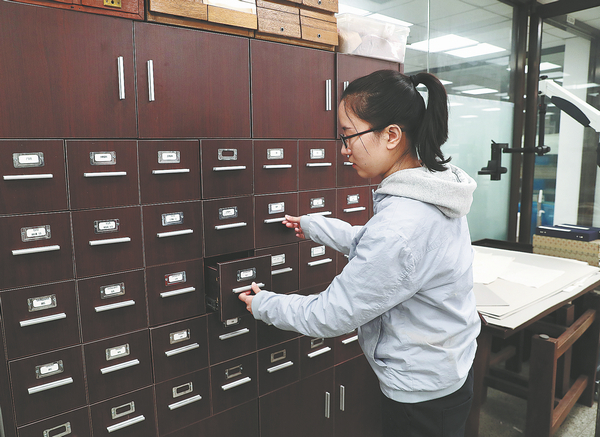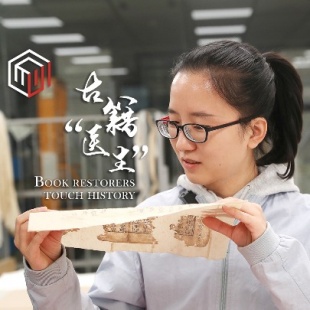Book restorers touch history


A dream come true
Despite the arduous nature of the work, Song was determined to join the field from an early age.
As a child, Song was captivated by documentaries about the world's cultural relics and became deeply intrigued by the art of artifact restoration.
"I was amazed by how the gray and dusty lumps unearthed from below the ground turned out to be delicate and stunning items," she says.
Song spent hours researching cultural relics, frequenting local museums and reading related books.
In senior middle school, those earlier experiences helped her to set her sights on becoming a master restorer of ancient books.
There were not many schools offering cultural-relic restoration courses back then, and her dream destination, Peking University, only offered openings every other year.
"It wasn't recruiting students in my graduation year," she says.
As Song looked into undergraduate curricula arrangement for that particular field of study, she found it was mostly related to chemistry. Therefore, she opted to start a chemistry degree at Fudan University in Shanghai, enrolling in 2008. In the interim, she continued to read up on cultural relics and study how museums operate.
"I got to learn how certain aspects of chemistry are going a long way in restoring cultural relics," she says.
Her dedication and hard work paid off when, after graduating from Fudan, she was accepted as a master's candidate to the prestigious cultural heritage preservation program at Peking University. From then on, she has been on a mission to make her dreams a reality.
Song spent most of her first year at work developing basic restoration skills and learning by observing her teachers at work.
She has, for instance, learned to never place a cup of water on the worktable nor wear high heels at work. "They might expose ancient books to hazards," she says.
She has also ensured that she uses a board to carry precious books, which are fragile and could be deformed if held, she explains.
"These professional habits must be developed from the beginning so that they become second nature," Song says.
In ancient book restoration, undoing work is generally not an option, as any redoing can cause further damage to the cultural artifact. "Therefore, every step must be thoroughly thought through before being executed," she emphasizes.
It usually takes at least two to three years from learning and following a master, before one can independently lead a restoration project.
Years of practice has taught her to respect everything from the pages, as any fragment could hold a record of key historical information. In Yongle Dadian's case, she would collect every scrap of paper during restoration for further analysis in the lab.
One time, Song even caught an actual bookworm alive amid the pages. She showed mercy for the creature despite it being an enemy to the books she loves, feeding it with paper.





































